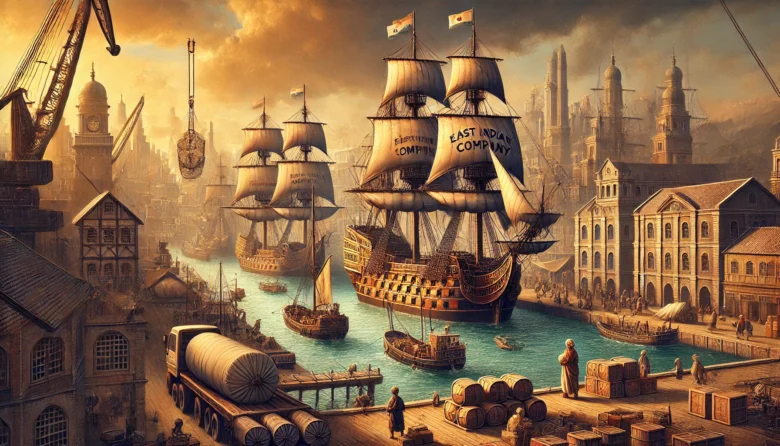Did you know that the East India Company, founded in 1600, was one of the first corporations to wield power similar to that of a modern nation-state?
Introduction
Throughout history, businesses have not just shaped economies; they’ve shaped civilizations. From the mercantile empires of the 17th century to today’s tech behemoths, corporate giants have played a pivotal role in driving growth and influencing societal change. In this blog, we’ll delve into the fascinating journey of corporate powerhouses across different eras, highlighting their contributions, challenges, and lessons for the future.
The Foundations of Corporate Power
The East India Company: A Trailblazer in Corporate Influence
Established in 1600, the East India Company (EIC) was more than a trading company; it was a geopolitical force. It controlled trade routes, waged wars, and even governed territories. At its peak, the EIC managed half of the world’s trade in commodities like spices, silk, and tea. While its success highlighted the power of monopolistic trade, its decline taught valuable lessons about unchecked corporate greed and ethical governance.
The Dutch East India Company: The World’s First IPO (Initial Public Offering)
The Dutch East India Company (VOC – Vereenigde Oost-Indische Compagnie) pioneered the concept of public investment in the 1600s. By allowing ordinary citizens to invest in its operations, the VOC not only amassed vast wealth but also set the stage for modern stock markets. However, mismanagement and over-expansion eventually led to its downfall, emphasizing the importance of sustainable growth.

Industrial Revolution: The Age of Titans
Standard Oil and the Rise of Monopolies
In the late 19th century, John D. Rockefeller’s Standard Oil Company became a symbol of corporate dominance. It revolutionised energy production and distribution by controlling nearly 90% of the U.S. oil market. However, its monopolistic practices eventually led to its breakup under antitrust laws, showcasing the need for regulatory frameworks in business.
The Carnegie Steel Company: Building America
Andrew Carnegie’s steel empire transformed the United States during the Industrial Revolution. His focus on innovation and efficiency made steel affordable, fueling infrastructure projects like railroads and bridges. Carnegie’s philanthropic legacy also highlights the role of corporate leaders in giving back to society.
The 20th Century: Corporations Go Global
Ford Motor Company: Democratizing Mobility
Henry Ford’s assembly line innovation revolutionized manufacturing and made cars affordable for the average person. The Ford Motor Company’s Model T wasn’t just a product but a symbol of social mobility and economic growth. Ford’s commitment to fair wages by introducing the $5 workday demonstrated the benefits of investing in employees.
IBM: The Tech Pioneer
In the mid-20th century, International Business Machines (IBM) became a leader in computing technology. By investing in research and development, IBM laid the groundwork for the digital revolution. Its story underscores the importance of adapting to technological change to stay relevant.
Modern Giants: Lessons from Today’s Titans
Amazon: Redefining Commerce
Founded in 1994 by Jeff Bezos, Amazon became an online bookstore and a global e-commerce leader. Its focus on customer-centric innovation, such as one-click shopping and fast delivery, revolutionized retail. However, Amazon’s labour practices and market dominance continue to spark debates about corporate responsibility.
Apple: Innovation as a Brand
Apple’s journey from a garage startup to a trillion-dollar company is a testament to the power of branding and innovation. Iconic products like the iPhone and MacBook transformed industries and consumer behaviour. Apple’s focus on design and user experience shows the importance of aligning products with customer aspirations.
https://www.youtube.com/watch?v=e6m5T-JBaUw&pp=ygUvSGlzdG9yeeKAmXMgQnVzaW5lc3MgVGl0YW5zIGFuZCBFY29ub21pYyBJbXBhY3Q%3DKey Lessons from Corporate History
Adaptability is Crucial: Companies like IBM and Ford demonstrate the importance of evolving with technological advancements.
Ethics Matter: The decline of entities like the East India Company highlights the dangers of prioritizing profit over ethical practices.
Investing in People: Henry Ford’s emphasis on fair wages underscores the value of employee well-being in long-term success.
Sustainable Growth: The fall of monopolistic giants like Standard Oil and the VOC reminds us that unchecked expansion can lead to collapse.
Conclusion
From the East India Company’s trade dominance to Apple’s tech revolution, corporate giants have continuously shaped the economic and social landscapes of their times. Their successes and failures offer timeless lessons on innovation, responsibility, and adaptability. As we navigate the challenges of the 21st century, understanding these lessons can guide businesses toward a future that balances growth with sustainability and ethics.
Remember: while companies may rise and fall, the principles they embody leave lasting impacts on society.
Author’s Note
History is a treasure trove of insights. By learning from the past, we can make informed choices for the future. If you found this blog engaging, let’s continue discussing business and history!
G.C., Ecosociosphere contributor.
References and Further Reading
- History of the East India Company – Encyclopedia Britannica
- How the Industrial Titans Shaped the Modern World
- 10 Brave Business Decisions That Changed The World – Employment & Business News. https://www.whatjobs.com/news/what-news-topical/10-incredible-business-decisions-that-changed-the-world/
- Rise Of Amazon Presentation And Google Slides Themes. https://www.slideegg.com/rise-of-amazon





Comments
With havin so much content and articles do you ever run into any problems of plagorism or copyright violation? My website has a lot of exclusive content I’ve either written myself or outsourced but it appears a lot of it is popping it up all over the internet without my authorization. Do you know any ways to help reduce content from being ripped off? I’d genuinely appreciate it.
Normally I don’t learn post on blogs, but I wish to say that this write-up very compelled me to check out and do so! Your writing taste has been surprised me. Thanks, very great post.